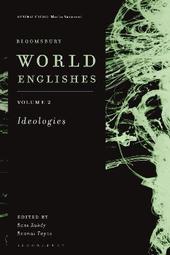
|
Bloomsbury World Englishes Volume 2: Ideologies
Hardback
Main Details
| Title |
Bloomsbury World Englishes Volume 2: Ideologies
|
| Authors and Contributors |
Edited by Dr. Rani Rubdy
|
|
Edited by Dr Ruanni Tupas
|
|
Edited by Mario Saraceni
|
| Physical Properties |
| Format:Hardback | | Pages:336 | | Dimensions(mm): Height 244,Width 169 |
|
| Category/Genre | Sociolinguistics |
|---|
| ISBN/Barcode |
9781350065840
|
| Classifications | Dewey:427 |
|---|
| Audience | | Tertiary Education (US: College) | |
|---|
|
Publishing Details |
| Publisher |
Bloomsbury Publishing PLC
|
| Imprint |
Bloomsbury Academic
|
| Publication Date |
17 June 2021 |
| Publication Country |
United Kingdom
|
Description
Bloomsbury World Englishes offers a comprehensive and rigorous description of the facts, implications and contentious issues regarding the forms and functions of English in the world. International experts cover a diverse range of varieties and topics, offering a more accurate understanding of English across the globe and the various social contexts in which it plays a significant role. With volumes dedicated to research paradigms, language ideologies and pedagogies, the collection pushes the boundaries of the field to go beyond traditional descriptive paradigms and contribute to moving research agendas forward. Volume 2: Ideologies explores the politics and economics of English, and the impact of language on local societies and cultures. In doing so, chapters discuss how English is often entangled in societal issues, such as inequality, (de-)colonization, racism, oppression and liberation.
Author Biography
Rani Rubdy is an independent researcher. Ruanni Tupas is Lecturer in Applied Linguistics at IOE, UCL's Faculty of Education and Society, University College London, UK. General Editor: Mario Saraceni
ReviewsBloomsbury World Englishes provides a modern variationist approach to research in Englishes that shifts from traditional descriptive research on formal nation state varieties and recognizes the breadth of variation within any community of speech. It celebrates variation and offers a more accurate understanding of these ever-changing languages that serves distinct and overlapping communities. * Elizabeth Winkler, Professor of Linguistics, Western Kentucky University, USA *
|